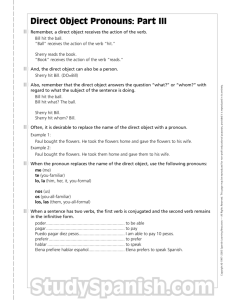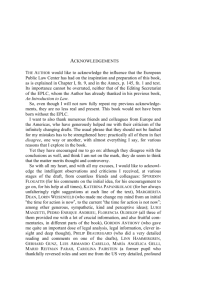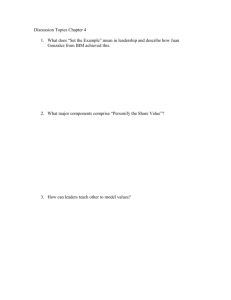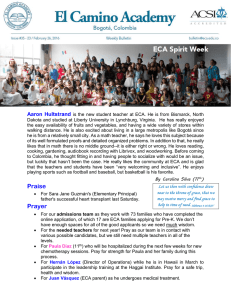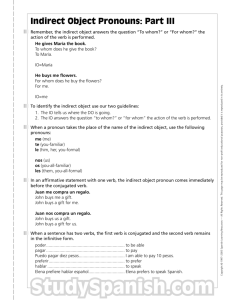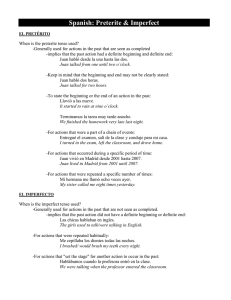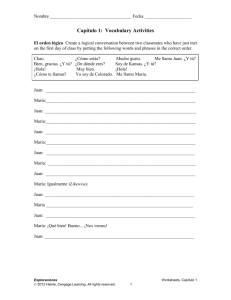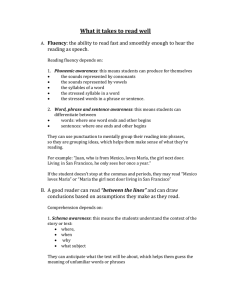Español II Unidad 1 Etapa 2 Direct Object Pronouns: verb
advertisement
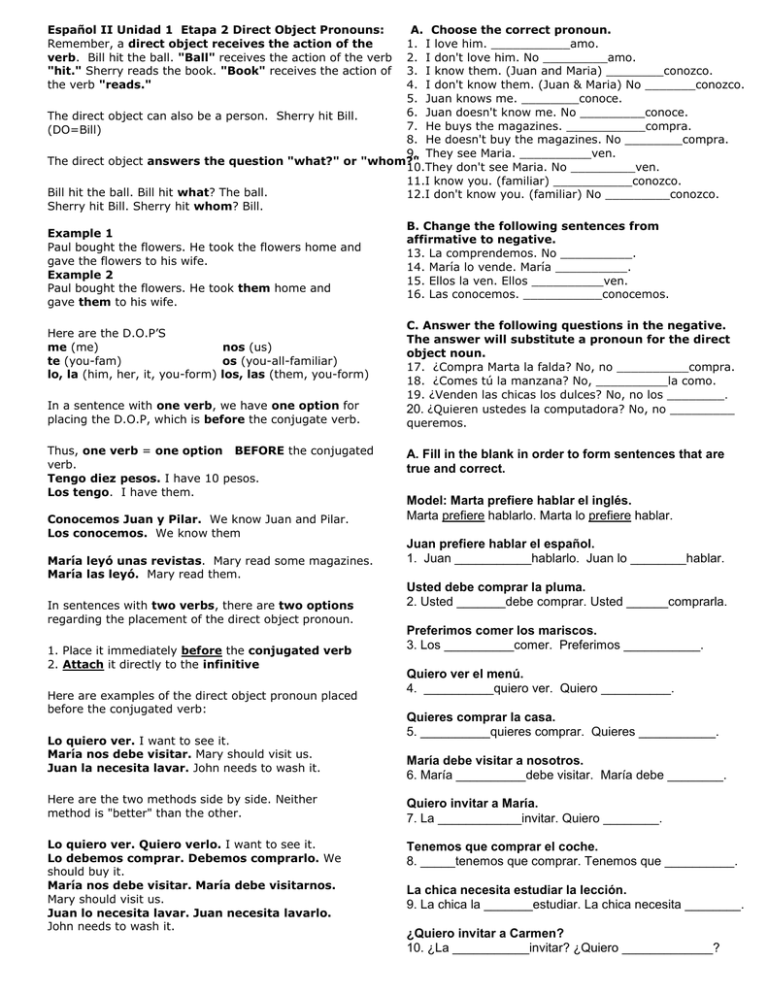
A. Choose the correct pronoun. 1. I love him. ___________amo. 2. I don't love him. No _________amo. 3. I know them. (Juan and Maria) ________conozco. 4. I don't know them. (Juan & Maria) No _______conozco. 5. Juan knows me. ________conoce. 6. Juan doesn't know me. No _________conoce. The direct object can also be a person. Sherry hit Bill. 7. He buys the magazines. ___________compra. (DO=Bill) 8. He doesn't buy the magazines. No ________compra. 9. They see Maria. __________ven. The direct object answers the question "what?" or "whom?" 10.They don't see Maria. No _________ven. 11.I know you. (familiar) ___________conozco. Bill hit the ball. Bill hit what? The ball. 12.I don't know you. (familiar) No _________conozco. Sherry hit Bill. Sherry hit whom? Bill. Español II Unidad 1 Etapa 2 Direct Object Pronouns: Remember, a direct object receives the action of the verb. Bill hit the ball. "Ball" receives the action of the verb "hit." Sherry reads the book. "Book" receives the action of the verb "reads." Example 1 Paul bought the flowers. He took the flowers home and gave the flowers to his wife. Example 2 Paul bought the flowers. He took them home and gave them to his wife. Here are the D.O.P’S me (me) nos (us) te (you-fam) os (you-all-familiar) lo, la (him, her, it, you-form) los, las (them, you-form) In a sentence with one verb, we have one option for placing the D.O.P, which is before the conjugate verb. Thus, one verb = one option BEFORE the conjugated verb. Tengo diez pesos. I have 10 pesos. Los tengo. I have them. Conocemos Juan y Pilar. We know Juan and Pilar. Los conocemos. We know them María leyó unas revistas. Mary read some magazines. María las leyó. Mary read them. In sentences with two verbs, there are two options regarding the placement of the direct object pronoun. 1. Place it immediately before the conjugated verb 2. Attach it directly to the infinitive Here are examples of the direct object pronoun placed before the conjugated verb: Lo quiero ver. I want to see it. María nos debe visitar. Mary should visit us. Juan la necesita lavar. John needs to wash it. Here are the two methods side by side. Neither method is "better" than the other. Lo quiero ver. Quiero verlo. I want to see it. Lo debemos comprar. Debemos comprarlo. We should buy it. María nos debe visitar. María debe visitarnos. Mary should visit us. Juan lo necesita lavar. Juan necesita lavarlo. John needs to wash it. B. Change the following sentences from affirmative to negative. 13. La comprendemos. No __________. 14. María lo vende. María __________. 15. Ellos la ven. Ellos __________ven. 16. Las conocemos. ___________conocemos. C. Answer the following questions in the negative. The answer will substitute a pronoun for the direct object noun. 17. ¿Compra Marta la falda? No, no __________compra. 18. ¿Comes tú la manzana? No, __________la como. 19. ¿Venden las chicas los dulces? No, no los ________. 20. ¿Quieren ustedes la computadora? No, no _________ queremos. A. Fill in the blank in order to form sentences that are true and correct. Model: Marta prefiere hablar el inglés. Marta prefiere hablarlo. Marta lo prefiere hablar. Juan prefiere hablar el español. 1. Juan ___________hablarlo. Juan lo ________hablar. Usted debe comprar la pluma. 2. Usted _______debe comprar. Usted ______comprarla. Preferimos comer los mariscos. 3. Los __________comer. Preferimos ___________. Quiero ver el menú. 4. __________quiero ver. Quiero __________. Quieres comprar la casa. 5. __________quieres comprar. Quieres ___________. María debe visitar a nosotros. 6. María __________debe visitar. María debe ________. Quiero invitar a María. 7. La ____________invitar. Quiero ________. Tenemos que comprar el coche. 8. _____tenemos que comprar. Tenemos que __________. La chica necesita estudiar la lección. 9. La chica la _______estudiar. La chica necesita ________. ¿Quiero invitar a Carmen? 10. ¿La ___________invitar? ¿Quiero _____________?
